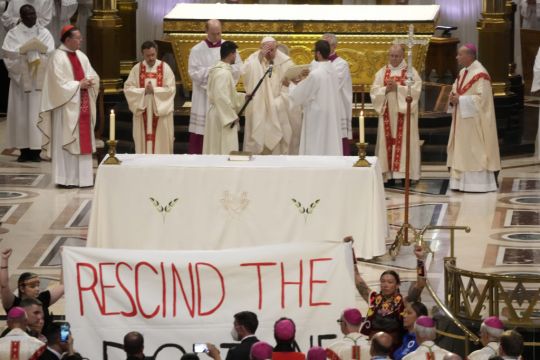Pope Francis celebrated Mass on Thursday at Canada’s national shrine and came face-to-face with a long-standing demand from Indigenous peoples.
They want him to formally rescind the papal decrees underpinning the so-called “Doctrine of Discovery” that seemingly legitimised the colonial-era seizure of Native lands and resources.
Right before Mass began, two Indigenous women unfurled a banner at the altar of the National Shrine of Sainte-Anne-de-Beaupre that read: “Rescind the Doctrine” in bright red and black letters.
The protesters were escorted away and the Mass proceeded without incident, though the women later marched the banner out of the basilica and draped it on the railing.
The brief protest underscored one of the lingering issues facing the Holy See following Francis’ historic apology for the Catholic Church’s involvement in Canada’s notorious residential schools, where generations of Indigenous peoples were forcibly removed from their families and cultures to assimilate them into Christian, Canadian society.
Francis has spent the week in Canada seeking to atone for the trauma and suffering of First Nations, Metis and Inuit peoples.
Beyond the apology, Indigenous peoples have called on Francis to formally rescind the 15th century papal decrees, or bulls, that provided European kingdoms the religious backing to expand their territories for the sake of spreading Christianity.
Those decrees have been seen as underpinning the Doctrine of Discovery, a legal doctrine coined in a 1823 US Supreme Court decision that has come to be understood as meaning that ownership and sovereignty over land passed to Europeans because they “discovered” it.
I sat down with both @Pontifex and Cardinal Pietro Parolin yesterday afternoon. We spoke about the importance of the Roman Catholic Church’s continued work with Indigenous Peoples to advance healing and reconciliation – and the need for the Church to take real, concrete action. pic.twitter.com/SJVtA8LL5P
Advertisement— Justin Trudeau (@JustinTrudeau) July 28, 2022
Prime Minister Justin Trudeau cited the need for the Holy See to “address the Doctrine of Discovery”, as well as other issues including the return of Indigenous artefacts in the Vatican Museums, in his private talks with Francis on Wednesday, Mr Trudeau’s office said.
Murray Sinclair, the First Nations chairman of Canada’s Truth and Reconciliation Commission, cited the doctrine in a statement this week welcoming Francis’ apology but calling on him to take responsibility for the full role of the church in the Canadian residential school system.
“Driven by the Doctrine of Discovery and other church beliefs and doctrines, Catholic leaders not only enabled the government of Canada, but pushed it even further in its work to commit cultural genocide of Indigenous peoples,” Mr Sinclair said.
“It was more than the work of a few bad actors — this was a concerted institutional effort to remove children from their families and cultures, all in the name of Christian supremacy.”
Church officials have insisted those papal decrees have long since been rescinded or superseded by other ones fully recognising the rights of Indigenous peoples to live on their lands, and say the original bulls have no legal or moral bearing today.
And Francis during the trip has reasserted repeatedly those rights and rejected the policies of assimilation that drove the residential school system, without referring though to his predecessors’ previous decrees legitimising colonialism.

Both the Vatican and Canadian trip organisers have confirmed that a new statement is being prepared to address the demands of Indigenous peoples for a current formal repudiation, though it is not expected to be released during Francis’ visit.
“The Vatican has clarified that the papal bulls associated with the Doctrine of Discovery have no legal or moral authority in the Church,” Neil MacCarthy, in charge of communications for the papal visit, told The Associated Press in an email.
“However, we understand the desire to name these texts, acknowledge their impact and renounce the concepts associated with them.”
Asked about the protest on Thursday, Mr MacCarthy said: “We recognise that there are very passionate feelings about a number of issues including the Doctrine of Discovery. The brief peaceful protest did not disrupt the service and the group had a chance to express their concerns.”
The service itself incorporated many Indigenous elements and peoples, including an emotional moment when a woman in Native dress wept in front of Francis as she brought him the offertory gifts.
Francis did not mention the doctrine issue in his homily, which spoke in general terms about reconciliation and the need for hope.

The Vatican clearly anticipated that the issue would arise during the trip. In an essay in the current issue of the Vatican-vetted Jesuit journal La Civilta Cattolica, the Rev Federico Lombardi acknowledged that the issue remains an important one for Indigenous peoples, but stressed that the Holy See’s position in repudiating the principles behind the 15th century bulls is clear.
Mr Lombardi, the retired Vatican spokesman, cited the subsequent 1538 bull “Sublimis Deus” that asserted that Indigenous peoples “are by no means to be deprived of their liberty or the possession of their property, even though they be outside the faith of Jesus Christ; and that they may and should freely and legitimately enjoy their liberty and the possession of their property; nor should they be in any way enslaved.”
For its part, the Canadian conference of bishops in 2016 published a statement firmly repudiating the doctrine as well as the related concept “terra nullius”. That 19th century term is also understood as legitimising the seizure of Indigenous lands, in that European settlers considered land “unused” if it did not show signs of European agricultural practices.
“We reject the assertion that the principle of the first taker or discoverer, often described today by the terms Doctrine of Discovery and terra nullius, could be applied to lands already inhabited by Indigenous Peoples,” the bishops’ statement said.
“We reject the assertion that the mere absence of European agricultural practices, technologies or other aspects common to European culture, could justify claiming of land as if it had no owner.”







